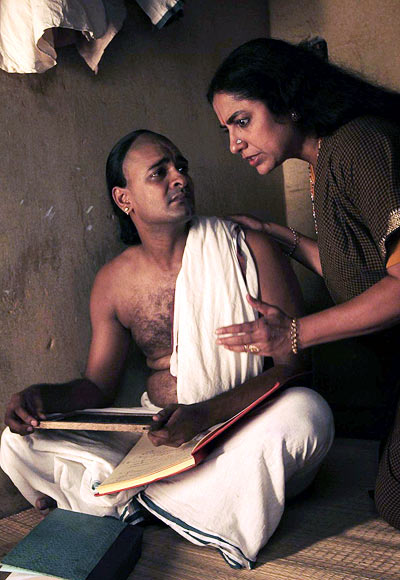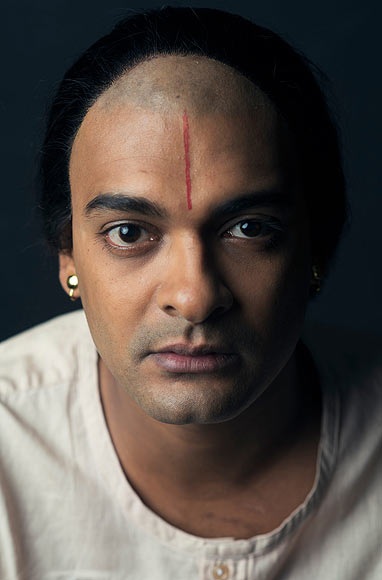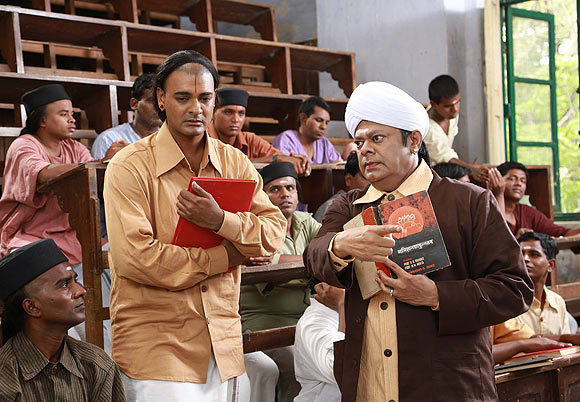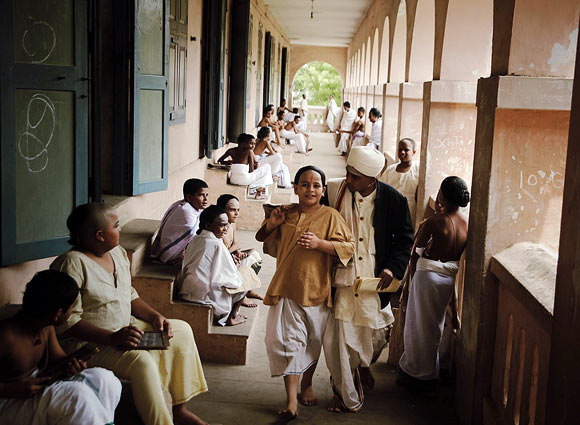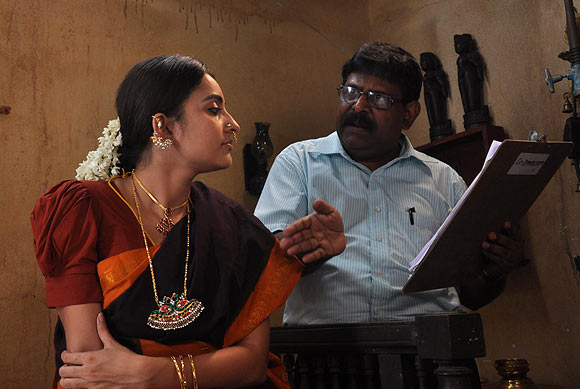 | « Back to article | Print this article |
'Everybody was unfair to Ramanujan'
Gnana Rajasekharan, an IAS officer of the Kerala cadre, took voluntary retirement to concentrate on what he loves the most, and where his heart belongs -- films.
His first feature film, Moha Mullu, won him the Indira Gandhi National Award for the Best First Film of a Director in 1994. His second feature film, Mugham, was made in 1999. His short film, Oru Kann, Oru Paarvai was selected for the Indian Panorama in 1998.
Bharathi (2000), a biographical film on Subramaniya Bharathi won four National Awards and six Tamil Nadu State Awards. In 2007, he made Periyar, another biopic based on the life of EVR Periyar. This film also won a National Award, and was screened at various international film festivals.
Now, he is in the process of making the biggest film of his career, Ramanujan, on the life of the great mathematician.
Gnana Rajasekharan talked to rediff about the film just before he left for London to shoot Ramanujan's life in the UK and his friendship with the English mathematician G H Hardy.
After Bharati and Periyar, why did you decide to make one more biopic?
Everybody comes to me to make biopics after Bharati and Periyar. As a director, I have done other films but after these two films, I have been asked to make only biopics. Even when I show them other scripts, they ask me to make biopics.
It is true that biographies give me a lot of intellectual satisfaction. I prefer making biopics of men who have shaped Indian or Tamil thinking so that I can concentrate on the social and intellectual life of the person. I am obsessed with such personalities.
'My film is an Indian perspective of Ramanujan'
What aspect of Ramanujan's personality attracted you?
Ramanujan was a genius and is respected all over the world. In fact, I would say he and his Mathematics are more understood outside India than here. He was a genius in pure Mathematics - which is not understood at all by the common man or even many mathematicians themselves.
I had read a story by Tamil writer Rahami on Ramanujan, serialised in a Tamil magazine in his centenary year. Later, it came out as a book.
I was fascinated by the book by Rahami because it was a Tamil perspective of Ramanujan.
Is the film a Tamil perspective of Ramanujan?
It is an Indian perspective of Ramanujan. When a Hollywood director makes a film, he will narrate it from his perspective. The perspective is the prerogative of the director.
'People branded Ramanujan a lunatic, a failure'
Still, why a biopic on Ramanujan?
That is because his life has a message for India even today. His life shows how a genius is handled by our society. His teachers knew he was a genius when he was in the sixth standard.
The film is about how our society, which includes parents, teachers, friends, relatives, neighbours, employers, etc, handles a genius. The fact is even today, we do not know how to handle a genius. That is why the film is relevant even today.
Do you feel everybody was unfair to Ramanujan?
Very much. The problem is we do not know how to take care of a genius and how to handle his eccentricities.
In our society, we look at these eccentricities as something wrong and we want to make him a “normal” and average person. Society is happy when it brings down a genius to an average person. Only then does he belong. This is the difference between Indian society and western society.
In the case of Ramanujan, as long as he came first in school, everybody praised him and called him the Tiger of Kumbakonam. When he started failing in other subjects because of his obsession with Mathematics, people started doubting his abilities. They branded him a lunatic, a failure.
'Ramanujan story is a sad one'
Do you feel he needed a G H Hardy to understand and appreciate his abilities?
I am not giving any importance to any personality. I want to show the contrast in the way Indian society and western society looked at him. He was roaming around like a lunatic in England but they let him be. That is the difference and I am showing this difference in a subtle way.
My film is about what Indian society had done to Ramanujan. If Ramanujan was alive today, the same thing would have happened. His parents would have forced him to go for Medicine or Engineering. The attitude is my child should achieve what I failed to achieve in life.
This film will be a lesson to parents, teachers and everyone in society. We don't allow a genius to prosper in our society; we only pull him down.
Do you think Ramanujan's story is a sad one, in a way?
Yes, it is a sad story. But I am looking at this sad story from the perceptive of a genius not being understood by the society, and that is how it becomes relevant even today.
'One-third of the film is set in London'
Are you making the film only for an Indian audience?
No, we are making the film simultaneously in English and Tamil. A major portion of his life was spent in London, so one-third of the film is set in London. Most film-makers go to London to shoot songs but our story takes place there.
My daughter Sindhu writes the dialogues for the English version.
Last year there were reports about many Hollywood film-makers planning to make films on Ramanujan...
Yes, there was a lot of interest in him but my film is different because it is from an Indian perspective. They will never look at his life the way I am looking at it.
Was it tough to find someone to act as Ramanujan?
When you make biopics, the major problem is casting. My casting of both Sayaji Shinde and Sathyaraj as Bharati and Periyar was appreciated.
Physical resemblance is very important for me. In the case of Ramanujan, his eyes and nose were the most important parts of his face, so I was looking for someone with intelligent eyes.
I stumbled upon the photo of a young guy in a Telugu film who had the same nose and eyes I was looking for. I chased him and found him and we had a photo shoot and I was satisfied.
It was only after that that I came to know that he was the grandson of Gemini Ganesan and Savithri. His name is Abhinay Vaddi. I am quite happy with the way he has performed so far.
We have Suhasini (Mani Ratnam) as his mother and Nizhalgal Ravi as his father.
' Since we are very poor in maintaining heritage buildings in Tamil Nadu, shooting outdoors was tough'
Why choose Bhama, a Malayalam actress, to act as the wife?
I was on the jury for the Kerala state awards and I saw her first film with the late Lohitadas. I was quite impressed with Bhama's performance. I have wanted to cast her in a film since then, but it happened only now. I wanted a young, innocent face for Ramanujan's wife. It was one of the wisest decisions I have taken. She stands out in the film.
Kevin McGowan, a theatre and film personality from the UK acts as Hardy, the mathematician. We also have an actor from the UK to act as chairman of the Madras Port Trust where Ramanujan worked.
How tough was shooting a period film?
The film starts in 1899 and ends in 1920. We started shooting in his home town, Kumbakonam, in the Town School where he studied and then in the Sarangapani temple. We also shot in his own house. Since we are very poor in maintaining heritage buildings in Tamil Nadu, shooting outdoors was tough.
In period films, two people are very important other than the cinematographer-- the art director and the costume designer.
My art director is the three-time National Award winning Krishnamoorthy, who has done all my films and also films like Oru Vadakkan Veera Gadha. The costume designer is my wife, Sakunthala. Cinematographer is Sunny Joseph.
